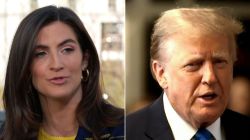Over the past few weeks, many Republicans have gone to bat for President Donald Trump, using a few standard arguments to defend him against the Democrat-led impeachment inquiry.
Here’s a look at the most common GOP defenses for why the President shouldn’t face an impeachment inquiry, and the facts around those arguments.
No quid pro quo
One line that Republicans have continually repeated is that there was no quid pro quo involved in Trump’s call with Ukraine’s President Volodymyr Zelensky. This, despite the fact that in the rough transcript of the call, Trump says, “I would like you to do us a favor though,” after Zelensky mentions his desire to purchase more Javelin missiles from the US.
Still, the no quid pro quo defense was among the list of talking points the White House sent around to Republicans on how to respond to criticism of Trump’s call with Zelensky, and which was then accidentally sent to House Democrats.
Within hours of the White House releasing the transcript, a number of Senate Republicans were using the “no quid pro quo” line. “I’ve read the transcript in its entirety. It shows that there was no quid pro quo,” Iowa Sen. Chuck Grassley told CNN.
“It reveals no quid pro quo,” Pennsylvania Republican Sen. Pat Toomey said to Politico.
The next day, on NPR’s All Things Considered, Ohio Rep. Jim Jordan echoed that talking point, saying, “When you read the transcript, there is nothing there… there was no quid pro quo.”
Over the past two weeks, Rep. Mark Meadows has tweeted several times that the idea there was quid pro quo is ridiculous. “Seeing some try to spin this section of the call into ‘quid pro quo’ and it’s laughable. To put it mildly,” he wrote on September 25.
Some experts have noted that because the US is Ukraine’s most powerful ally, and much of the country’s safety from Russia depends on US support, all requests from President Trump come with some kind of underlying pressure.
The question of quid pro quo is a moot point for many Democrats weighing whether to impeach the President, seeing as how there is no disputing that Trump did ask a foreign government to investigate a political opponent during an election season.
Hours before announcing a formal impeachment inquiry, Speaker of the House Nancy Pelosi said at The Atlantic Festival that “there is no requirement there be a quid pro quo in the conversation.”
He’s just investigating corruption
Republicans also tend to argue that Trump is simply trying to uncover corruption by asking other countries to investigate the Bidens.
House Minority Whip Steve Scalise said on MSNBC September 29 that in their conversation “(Zelensky) and President Trump are talking about…things that both of them are doing to clean up corruption and drain the swamp.”
On October 4, Sen. Ron Johnson told reporters that Trump is “concerned about corruption” and that he takes “what President Trump is saying at face value.”
Given Trump’s past statements and actions, there is reason to be suspicious of his claims that this has nothing to do with politics, and that his sole motivation is to clean up corruption.
In the transcript of his phone call with Zelensky, Trump never mentions “corruption” and only focuses on conspiracy theories around the DNC server, a US cybersecurity firm, and the Bidens. There’s no evidence to support any of the theories mentioned by Trump.
Trump has also defended and expressed sympathy for his former campaign chairman Paul Manafort, who spent years working for the corrupt (and pro-Putin) former Ukrainian President Viktor Yanukovych.
Manafort is currently in prison for tax fraud.
The whistleblower only had secondhand knowledge
Republicans have also repeatedly argued that the whistleblower’s complaint is not credible because he only had secondhand knowledge of the phone call between Trump and Zelensky.
Rep. Kevin McCarthy tweeted on September 29 that one of the most important facts was that “the whistleblower wasn’t on the call.”
Sen. Lindsey Graham told CBS that the whistleblower complaint was “all hearsay,” arguing that because “the whistleblower didn’t hear the phone call” then the complaint “is a sham.”
The intelligence community’s inspector general, Michael Atkinson, debunked the notion that the allegations against Trump were all based on hearsay, writing in a September 30 letter that the whistleblower did have “direct knowledge of certain alleged conduct” and this information significantly helped the IG in reaching a “credible” determinate.
That hasn’t stopped Republicans from repeating the notion that the complaint against Trump is based on hearsay. “You think about what the Democrats are trying to do,” Jordan said October 8, “impeach the President of the United States 13 months prior to an election based on an anonymous whistleblower with no firsthand knowledge who has a bias against the President.”
The law surrounding whistleblowing in the intelligence community does not prohibit individuals with secondhand information from coming forward. In fact, the inspector general has 14 days to investigate any complaint of urgent concern and within those 14 days, the IG must find firsthand information in order to determine that the urgent concern is “credible” and pass it up the command chain.
Never mind the fact that Trump has already released the primary document in the complaint: the call with Zelensky. And according to Mark Zaid, the attorney who represents the first whistleblower, a second whistleblower has come forward with firsthand information on some of the allegations in the original complaint.
It was a joke
Another defense of the President that Republicans have continued to trot out is that the media is taking him too seriously. In other words, that he was joking. This defense has been used in particular to address Trump’s request for China to investigate the Bidens. There’s no evidence that Trump was joking and Trump has never claimed that he was.
Still, that’s the argument that both Jordan and Florida Sen. Marco Rubio have made in the past few days.
“I don’t think it’s a real request,” Rubio said on October 4. “I think he did it to get you guys. I think he did it to provoke you to ask me and others and get outraged by it. He plays it like a violin and everyone falls into it. That’s not a real request.”
Jim Jordan agreed, saying Sunday “as I think Sen. Rubio said a couple days ago. I think he’s getting the press all spun up about this.”
CNN has also reported that in June, Trump discussed Biden and Elizabeth Warren on a phone call with Chinese President Xi Jinping and told Xi that he would keep quiet on Hong Kong protests as trade talks progressed.
Schiff met with the whistleblower
One of the primary tactics Republicans have used when defending Trump is to attack House Intelligence Chairman Adam Schiff.
“Schiff didn’t even tell us that he had met with the whistleblower prior to the whistleblower filing the complaint,” Jordan said Tuesday in defense of the Trump administration blocking EU Ambassador Gordon Sondland from testifying before congress.
While Schiff did incorrectly state in a September interview on MSNBC that his committee had not spoken with the whistleblower prior to the complaint being filed, it is also incorrect to claim that Schiff himself met with the whistleblower.
Staffers did have contact with the whistleblower prior to the complaint being filed and advised them to contact the Intelligence Community’s Inspector General. While Schiff did have general knowledge about the concerns of the whistleblower, there is no evidence that he had met with the whistleblower.




















